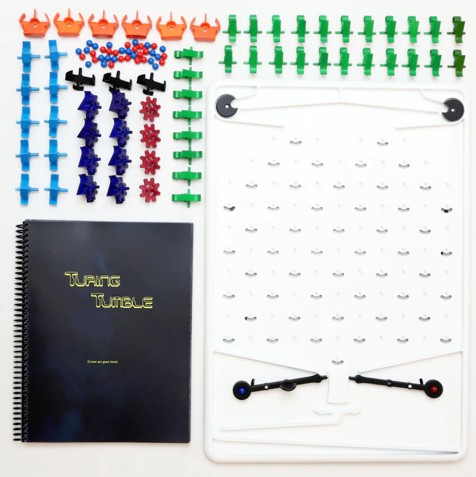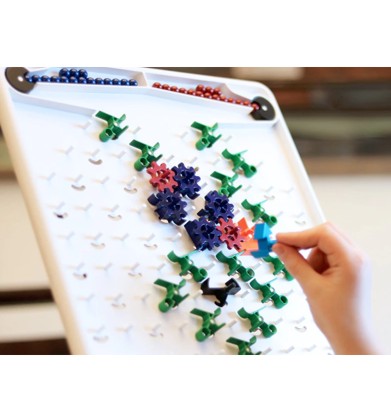| Understand Computer Logic With Turing Tumble |
| Written by Lucy Black |
| Sunday, 04 June 2017 |
|
Turing Tumble, a game that lets you build a mechanical computer powered by marbles to solve logic puzzles and is intended to teach kids how to think about computers, has already well exceeded its target on Kickstarter. The project comes from Paul Boswell who, in his time as a professor at the University of Minnesota, saw for himself that it was important that all students, whatever the subject they were studying, needed to be able to code. He now has three young children and has used many types of games to encourage an interest in coding. The motivation for Turing Tumble is to enable its users, kids and adults alike to discover how a computer works and to get beyond seeing the computer as an abstract black box but instead understand how switches connected together in clever ways can do incredibly smart things. Introducing it in this video he says: Turing Tumble is the only game that lets kids see and feel how computers work. The logic isn’t hidden inside a computer chip – it’s all right there in front of them. It builds logic and critical thinking skills, fundamental coding concepts, and grounds their understanding of computers.
As you can see in the video, the involves a set of marbles. Players roll one at a time down a ramp through a series of pins and "logic" pieces. When the marble hits a flipper at the bottom it releases another ball – creating a computing cycle. Boswell explains: "Players add logic to the game board by placing six different types of parts onto the board. The 'Bit' is a particularly important one. Each time a ball runs over it, it flips to point the opposite direction. Pointing to the left is like a '0', and pointing to the right is like a '1.' Gear bits are the most interesting part, though. Gear bits are just like bits, except that they can be connected to one another so that when one is flipped, it flips the connected gear bits, too. It's these parts that make the computer Turing-complete." In addition to the board, its stand, the marbles and all the parts described above, Turing Tumble comes with a book in which 51 puzzles, graduated in difficulty, are woven into a 20-page story illustrated by Jiaoyang Li, a senior at the University of Minnesota, majoring in both art and computer science.
The Kickstarter for Turing Tumble opened on May 31st and its original goal for of $48,000 was reached within 14 hours, and it had double that the following day. It has now reached its first stretch goal of $150,000, which means the box will have a vacuum molded insert with shaped holes for the individual parts. If the next stretch goal of $200,000 is reached the box will be of a premium design with a magnetic latch, constructed with thick cardboard. Coming late to the Kickstarter means we've missed the Early Bird offer on the first 250 kits which were the only ones with pre-Christmas delivery. There are however still savings to be made on the standard Turing Tumble game, ones with extras by way of pieces and even with an exclusive T-shirt, and packs of multiple kits all of which are due to ship in January 2018. Also scheduled for January 2018 a pledge of $15 buys a virtual kit with a digital copy of the puzzle book and the 3D CAD files to generate the parts so that you could 3D print them for yourself.
More Information
Related ArticlesSoftware Makes Cheap Dumb Robots Interesting - Bots_Alive A 4-Bit Adder Made Of Cardboard! To be informed about new articles on I Programmer, sign up for our weekly newsletter, subscribe to the RSS feed and follow us on Twitter, Facebook or Linkedin.
Comments
or email your comment to: comments@i-programmer.info
|
| Last Updated ( Monday, 05 June 2017 ) |



